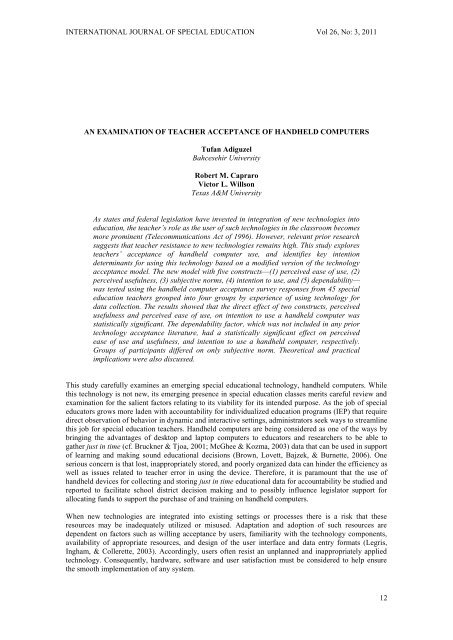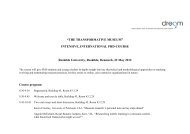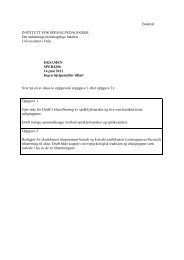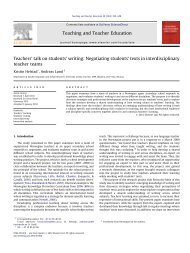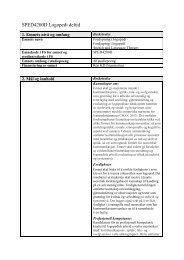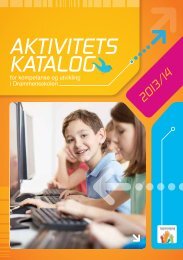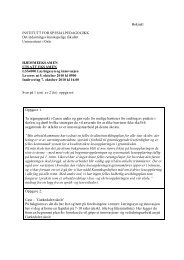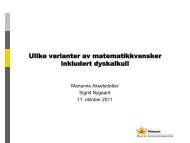International Journal Special Education
International Journal Special Education
International Journal Special Education
Create successful ePaper yourself
Turn your PDF publications into a flip-book with our unique Google optimized e-Paper software.
INTERNATIONAL JOURNAL OF SPECIAL EDUCATION Vol 26, No: 3, 2011AN EXAMINATION OF TEACHER ACCEPTANCE OF HANDHELD COMPUTERSTufan AdiguzelBahcesehir UniversityRobert M. CapraroVictor L. WillsonTexas A&M UniversityAs states and federal legislation have invested in integration of new technologies intoeducation, the teacher’s role as the user of such technologies in the classroom becomesmore prominent (Telecommunications Act of 1996). However, relevant prior researchsuggests that teacher resistance to new technologies remains high. This study exploresteachers’ acceptance of handheld computer use, and identifies key intentiondeterminants for using this technology based on a modified version of the technologyacceptance model. The new model with five constructs—(1) perceived ease of use, (2)perceived usefulness, (3) subjective norms, (4) intention to use, and (5) dependability—was tested using the handheld computer acceptance survey responses from 45 specialeducation teachers grouped into four groups by experience of using technology fordata collection. The results showed that the direct effect of two constructs, perceivedusefulness and perceived ease of use, on intention to use a handheld computer wasstatistically significant. The dependability factor, which was not included in any priortechnology acceptance literature, had a statistically significant effect on perceivedease of use and usefulness, and intention to use a handheld computer, respectively.Groups of participants differed on only subjective norm. Theoretical and practicalimplications were also discussed.This study carefully examines an emerging special educational technology, handheld computers. Whilethis technology is not new, its emerging presence in special education classes merits careful review andexamination for the salient factors relating to its viability for its intended purpose. As the job of specialeducators grows more laden with accountability for individualized education programs (IEP) that requiredirect observation of behavior in dynamic and interactive settings, administrators seek ways to streamlinethis job for special education teachers. Handheld computers are being considered as one of the ways bybringing the advantages of desktop and laptop computers to educators and researchers to be able togather just in time (cf. Bruckner & Tjoa, 2001; McGhee & Kozma, 2003) data that can be used in supportof learning and making sound educational decisions (Brown, Lovett, Bajzek, & Burnette, 2006). Oneserious concern is that lost, inappropriately stored, and poorly organized data can hinder the efficiency aswell as issues related to teacher error in using the device. Therefore, it is paramount that the use ofhandheld devices for collecting and storing just in time educational data for accountability be studied andreported to facilitate school district decision making and to possibly influence legislator support forallocating funds to support the purchase of and training on handheld computers.When new technologies are integrated into existing settings or processes there is a risk that theseresources may be inadequately utilized or misused. Adaptation and adoption of such resources aredependent on factors such as willing acceptance by users, familiarity with the technology components,availability of appropriate resources, and design of the user interface and data entry formats (Legris,Ingham, & Collerette, 2003). Accordingly, users often resist an unplanned and inappropriately appliedtechnology. Consequently, hardware, software and user satisfaction must be considered to help ensurethe smooth implementation of any system.12


